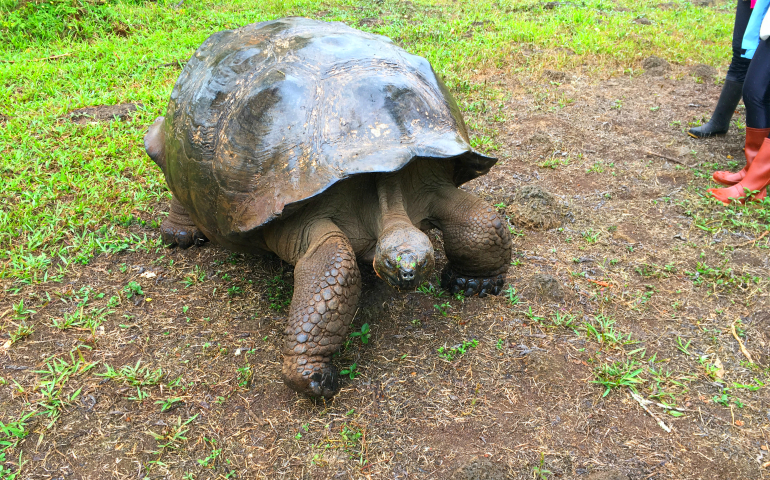
This tortoise was interested in following me. (Mary Ann McGivern)
I spent a week in the Galápagos in mid-September. The Galápagos are an archipelago of volcano-formed islands off Ecuador in the Pacific Ocean. The experience walking on the islands and snorkeling in the water -- with animals and birds and fish -- was paramount. And the guides and dinghy pilots saw and showed us everything. But at the same time, we learned a smattering of geology, of natural selection, of human bad behavior, of Ecuador's national park development, of the tortoise incubation process. And living on the boat was frosting. Yes, we lived on a yacht and traveled in the night from island to island.
It was a trip of a lifetime, a gift from my Loretto community, an astonishing immersion into nature. I had never snorkeled, and there, face down in the water I was swimming with schools of brilliantly colored fish and even a turtle.
On land we visited a dairy farm that is on the tortoise migration route. I stood in front of a tortoise shell -- two meters back as the park rules require -- and the tortoise peered out at me, got up and stepped toward me. I stepped back, taking another photo. He stepped forward, and I stepped back, again and again and again. I took a picture each time, and I have eight photos! I was wearing a chartreuse green raincoat and the guide thought the tortoise wanted a taste of that green. The guide had never seen a tortoise show such interest in anything, much less a standing person. For me it was a moment of my total attention on the tortoise and his seeming total focus on me.
The islands are known for their blue-footed boobies. They got their name from English pirates who disdained their lack of fear and the ease with which they could be hit on the head and then picked up to be prepared for dinner. But the Spanish call them piqueros de patos azules, or "arrows with blue feet," because to catch a fish they fly high and then dive straight into the ocean, coming back to the surface with supper. These diving piqueros are breathtakingly beautiful. But, alas, their blue feet are printed on tee shirts and aprons at breast level in all the shops with the slogan, "I love my boobies." Such a disrespectful pun repeated over and over for such beautiful birds.
Ecuador's National Park Service has strict environmental rules: very limited access to the islands; paths tourists must follow on the islands; no use of flash when taking photos. The residents, about 25,000, are limited to a total of 1,300 automobiles. To get a new car, you must retire an old one. No vegetable or flower gardens with non-native plants. One thing the guides couldn't tell me was how Ecuador gathered its political will back around 1998 or so to decide to protect these islands. The guides were children then. They care about nesting flamingos and albatross (which we saw), not politics.
But each bird and frog and tree is precious. Back home, we have to pay better attention, take better care.



